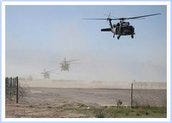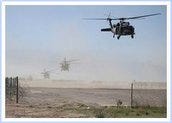

This is the picture of the helicopters I was trying to post the other day; issued as far as I know by the US military. Everyone loves helicopters, of course. Maybe it's a movie thing. I'm still struggling with the technology. l don't, for instance, even know how to make this photograph bigger, although it must be easy. Maybe it's just a function of being 53; an age I never dreamed of arriving at. We've just had the British Prime Minister Tony Blair passing through Australia; and generally the irony of our own so-called "conservative" Prime Minister John Howard getting on famously with a British Labour leader, while our own Labour leader, Kim Beazley, was regularly highlighted for his many perceived failings. Beazley came off second best, compared poorly with Blair, his elegance, his intellect, his sweeping and impressive turns of phrase, grasp of detail and understanding of international politics; who according to the commentators had as a leading social democrat no peer in this country.
Our own left wants to "cut and run" from Iraq, Howard wants to stay. It has been a bizarre positioning. I said on radio one night, the Australian attitude to the war will turn when the Australian body bags start coming back. But Howard has been lucky, unlike America and the appalling toll, over 2300 now I think, the Australian public has not been been disturbed by the harrowing sight. The phone rang with complaints the next morning, how dare I say such a thing. But I shrugged it off. It was true.
Minnesotta farm boys, their handsome smiles, looking smart in their uniform, sad reminders of lives that could have been, had become, at least from this distance, a part of the fabric of American life. The Australian public remains pretty solidly against the war; and the mess, the daily mess, the unbelievable death count, just confirms that. But even so, the fact that we are at war in a far off country, aligned with the never very popular yanks, has had no real impact on the country's psyche or mood. It's disengaged, like a television still running on a garbage tip, the thing simply doesn't seem real. New Zealand took the high moral ground and refused to engage, but not us. With minimum numbers and minimum body counts, Howard has managed to support the US and strut his stuff on the world stage, portrayed as a man of courage and vision who can cut it with the world's leaders. Most journalists, like most of the public, remain opposed. But the commentary, ramped up as a result of Blair's visit, suggests otherwise.
It's all very strange. I remember, too, on radio, commenting the night the Saddam statue was pulled down, that sometimes you knew when you were watching history. The statue fell, but it was a stupid thing to say, and unfortunately impossible to unsay; not that in the fleeting welter of words these things had any great import. The polls suggest the Australian public agrees with Howard, they don't want to cut and run either. We're there now. We have to see the job through. Whatever that job may be. We can hardly take up arms against every country in the world with an oppressive regime. Are we really going to take on Burma, China, half of Africa? But these contradictions, from a child of the seventies and the Vietnam protests, remain as confused and as unsatisfactory as ever.
MEDIA WATCH:
From Reuters:
CANBERRA (Reuters) - Prime Minister Tony Blair said on Monday that Iraq and Afghanistan were decisive battlegrounds for the values the West believes in and warned of the risk of a U.S. retreat into isolationism.
In a speech to the Australian parliament, Blair made his case for the West to get involved in a broad range of issues, not just on the security front, in its struggle against Islamist militants.
U.S. allies Australia and Britain both have troops in Iraq and Afghanistan, but Australian opposition leader Kim Beazley has said a future Labour government would withdraw Australian troops as soon as possible.
Blair, America's closest ally in Iraq, acknowledged that the war there had divided both Australia and Britain, but portrayed Iraq and Afghanistan as critical battlegrounds.
"Every reactionary element is lined up to fight us. They know if they lose, a message is sent out across the Muslim world that strikes at the heart of their ideology," Blair said.
"We must not hesitate in the face of a battle utterly decisive as to whether the values we believe in triumph or fail ... If the going is tough -- we tough it out. This is not a time to walk away. This is a time for courage to see it through," said Blair, who received a standing ovation.
Outside parliament, about 100 anti-Iraq war protesters, holding placards saying "B.liar" and "Troops out of Iraq", blew whistles and trumpets to try to disrupt the visit, but they were kept well away.
FROM THE CHICAGO TRIBUNE:
BAGHDAD -- A suicide bomber struck an army recruiting center Monday, killing at least 40 people in front of a joint U.S.-Iraqi military base between Mosul and the ancient city of Tal Afar.In another gruesome discovery in the nation, 29 bodies were found, nine with nooses around their necks.A variety of attacks with guns, bombs, mortars and rockets killed at least 12 other people, including seven who died in Baghdad when a rocket hit a building that housed the headquarters of the Shiite Fadhila Party.And gunmen in four civilian cars kidnapped 16 employees of an Iraqi trading company in Baghdad's upscale Mansour neighborhood.
FROM THE ASIAN TRIBUNE:
The massacre of as many as 40 unarmed worshipers in a northeast Baghdad mosque Sunday has triggered a political crisis that threatens to accelerate Iraq’s descent into civil war while sharply intensifying the hatred of millions of Iraqis for the three-year-old US occupation of their country. Reuters news agency Monday cited Iraq’s security minister accusing "US and Iraqi forces of killing 37 unarmed civilians in the mosque after tying them up." Other police sources said that the victims numbered around 20. While US military sources and Iraqi eyewitnesses have given conflicting versions of the bloodbath, it is undisputed that killings were carried out early Sunday evening by a combined force of US special forces and US-trained Iraqi commandos. The mosque where the massacre unfolded is in a neighborhood that is a stronghold of the Mehdi Army, the militia loyal to the radical nationalist Shiite cleric Muqtada al Sadr. While those killed apparently included some of his followers, others were apparently members of Dawa, which is the party of Iraqi Prime Minister Ibrahim al-Jaafari, and other Shiite parties. The evidence supporting the claims that what took place was a massacre organized and executed by the US occupation authorities is overwhelming. Video footage broadcast over Iraqi television and photographs shot at the scene clearly depict unarmed bodies, many of them elderly men, heaped on the carpeted floor of a prayer room in the Mustafa mosque. As outrage over the incident erupted in Iraq, Washington sought to distance itself from the killings. The shifting US account of the incident suggested a crude attempt at cover-up. Initially, Centcom, the US regional military command, reported that 16 “insurgents” had been killed in a raid conducted by US and Iraqi troops in Adhamiyah, a former Baathist stronghold, where Saddam Hussein was seen surrounded by a cheering crowd after the US invasion had begun.



